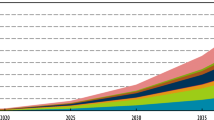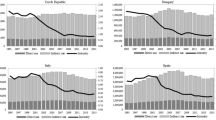Abstract
This paper develops a static neoclassical general equilibrium model of the Mexican economy that focuses on production, consumption, and exports of energy goods. The specification of the model allows the government to set prices and production levels of energy goods exogenously. Domestic prices differ from international prices, and net exports of these goods are determined residually. The level of energy exports is a major factor in the determination of the government and trade deficits. The analysis presented in this paper serves as a case study of how to design and use an applied general equilibrium model to do policy analysis. An interesting feature is that the model itself is used to determine one of the key parameters, the elasticity of substitution of non-energy imports for domestic goods.
Similar content being viewed by others
References
Armington P (1969) A theory of demand for products distinguished by place of production. IMF Staff Papers, 16:159–178
Barro R (1974) Are government bonds net wealth? Journal of Political Economy, 82:1095–1118
Garcia-Alba P, Serra-Puche J (1983) Financial aspects of macroeconomic management in Mexico, Joint Research Program Series, 36, Institute of Developing Economics, Tokyo, Japan
Harberger A (1962) The incidence of the corporation income tax, Journal of Political Economy, 70, 215–240
Johansen L (1960) A Multi-Sectoral Study of Economic Growth. Amsterdam: North-Holland
Kehoe TJ (1985) The comparative statics properties of tax models, Canadian Journal of Economics, 18: 314–334
Kehoe TJ, Manresa A, Noyola PJ, Polo C, Sancho F (1988), A general equilibrium analysis of the 1986 tax reform in Spain, European Economic Review, 32:334–342
Kehoe TJ, Serra-Puche J (1983a) A computational general equilibrium model with endogenous unemployment: An analysis of the 1980 fiscal reform in Mexico, Journal of Public Economics, 22: 1–26
(1983b) A general equilibrium appraisal of energy policy in Mexico, Working Paper No. 321, Department of Economics, Massachusetts Institute of Technology
Kehoe TJ, Whalley J (1985) Uniqueness of equilibrium in large scale numerical general equilibrium models. Journal of Public Economics, 28:247–254
Scarf HE (in collaboration with Hansen T) (1973) The Computation of Economic Equilibria. New Haven: Yale University Press
Serra-Puche J (1983) A general equilbrium model of the Mexican economy, in H.E. Scarf and J.E. Shoven, eds., Applied General Equilibrium Analysis. Cambridge: Cambridge University Press
Shoven JB, Whalley J (1984) Applied general equilibrium models of taxation and international trade, Journal of Economic Literature, 22: 1007–1051
Author information
Authors and Affiliations
Rights and permissions
About this article
Cite this article
Kehoe, T.J., Serra-Puche, J. A general equilibrium appraisal of energy policy in Mexico. Empirical Economics 16, 71–93 (1991). https://doi.org/10.1007/BF01205346
Issue Date:
DOI: https://doi.org/10.1007/BF01205346




